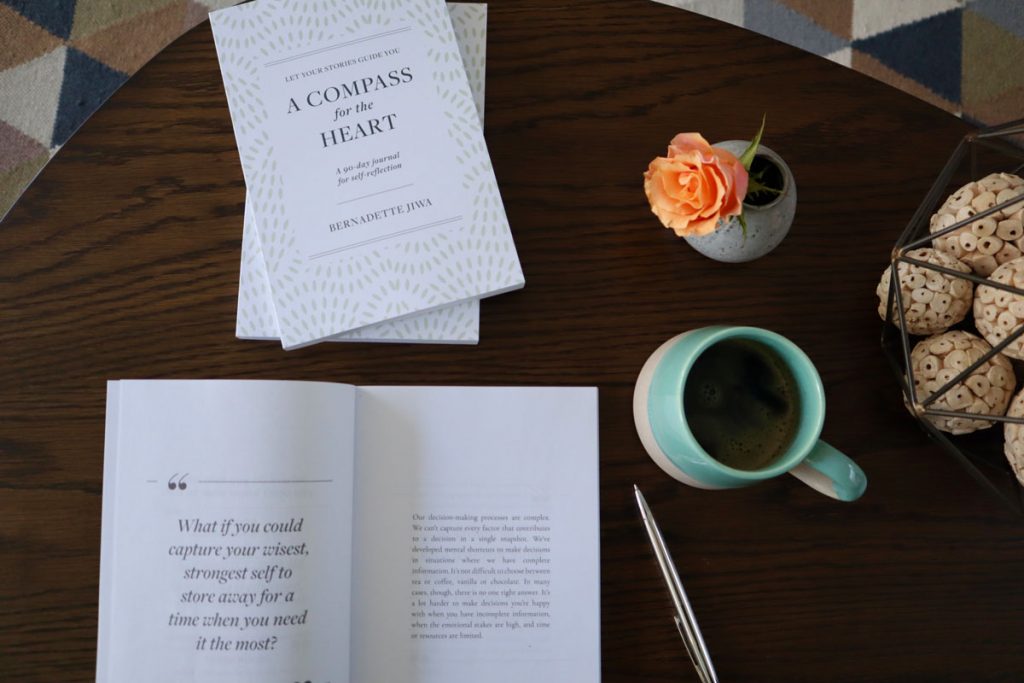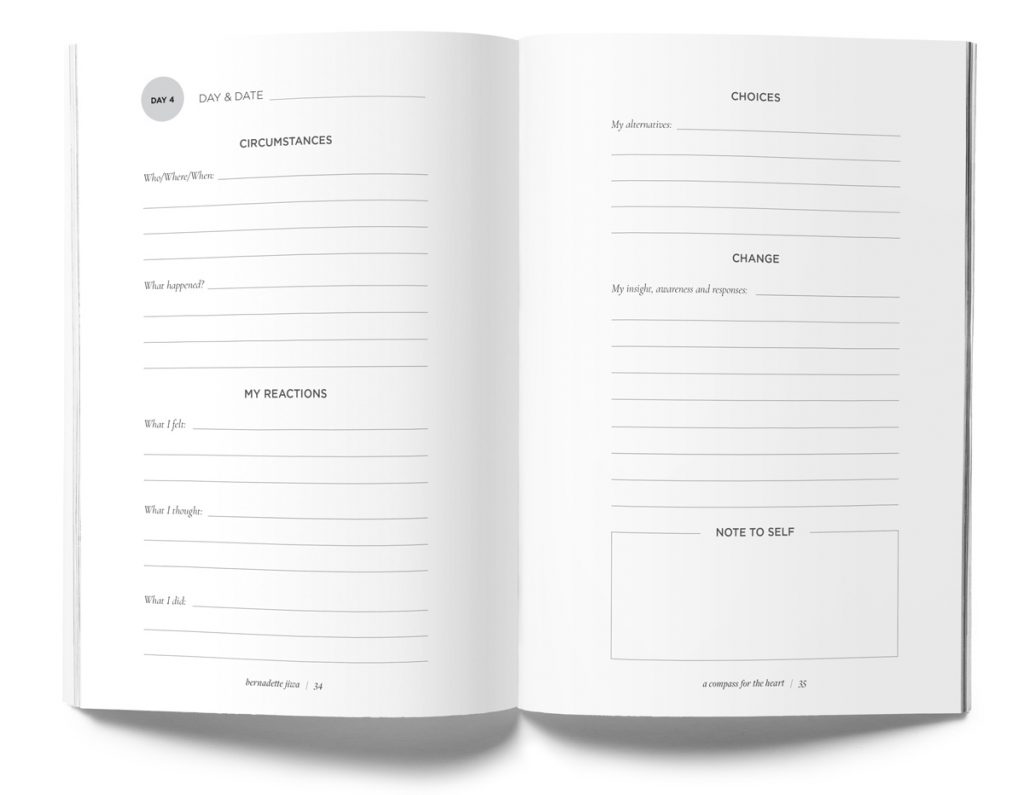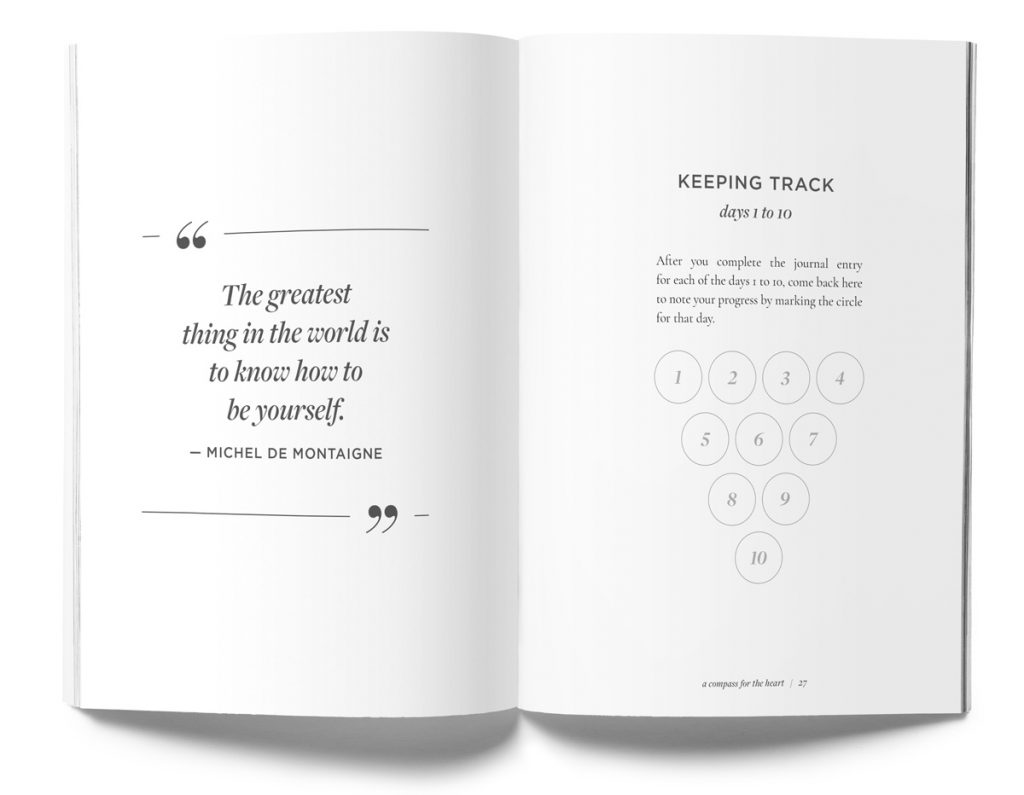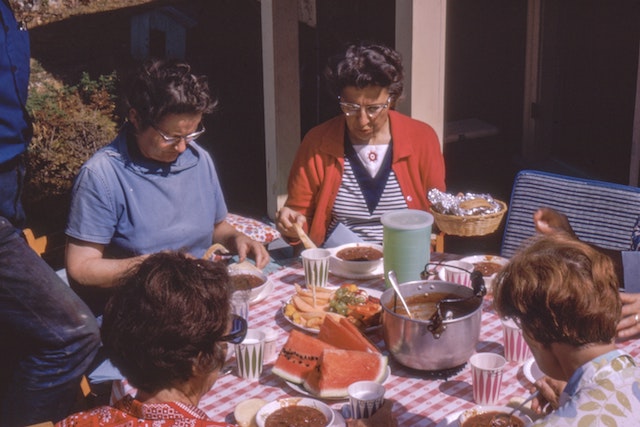Unlock the Magic in Your Story Now
Get the Free 20 questions to Ask Before Launching Your Idea workbook when you sign up for occasional updates.
Get the Free 20 questions to Ask Before Launching Your Idea workbook when you sign up for occasional updates.
Articles filed in: Strategy
A Compass For The Heart
filed in Meaningful Work, Strategy, Success

Where do you turn when you don’t know what to do?
Perhaps you do a Google search for facts. Maybe you read a book and get information. You might consult a professional for their expertise. And friends will gladly offer you opinions based on their experiences.
You can only gain insights and intuition based on your experience by taking time to reflect. Every day we have the opportunity to use yesterday’s stories as wise counsel for tomorrow. But we don’t have a way of remembering, recording or reflecting on what those everyday stories can teach us.
Inspired by my work with thousands of Story Skills Workshop students. I created
A Compass For The Heart. It’s a 90-day guided journal for self-reflection that helps you to record the everyday stories and life lessons to guide your decisions in good times and bad.
Inside, you’ll find a simple framework and templates for daily reflection that help you to capture your wisest, strongest self to store away for a time when you need it the most.


Although I’m a writer and I gather stories every day, I’ve never been one for journaling. There’s something about that blank page that’s intimidating. It feels like a sacred space for only the most elevated thoughts.
If like me, you’ve tried and failed to create a reflection ritual or journaling practice in the past, I hope you’ll give A Compass For The Heart a try. You can buy it now from Amazon.com, Amazon.co.uk, Amazon.ca or by searching your regional Amazon store. *Note: The journal will be available in Amazon’s Australian store in 6 weeks.
Thank you as always for giving me a reason to reflect, write and create. It’s a joy and a privilege to share ideas with you.
The Value Conundrum
filed in Marketing, Strategy, Success

When I was growing up, my mother tried selling various products from home to earn extra money to support our family. I remember cookware and cosmetics being demonstrated to small groups of her friends over cups of tea and homemade sponge cake in the living room.
From day-to-day, Mum used the same old pans that had been handed down to her by my granny, and she hardly ever wore makeup. So her sales pitch usually came unstuck when she tried to demonstrate the products. She couldn’t show her friends how the products would make their lives easier or better.
Every purchase is a dance between risk and reassurance. The people we want to help must have faith in us before they can believe in the value we create or the stories we tell.
Image by Annie Spratt
Forward Thinking
filed in Meaningful Work, Strategy, Success

Every business owner or leader, entrepreneur or creative, walks the fine line between creating value in the present and thinking about what their contribution might be in the future. We need to do the work that’s in front of us today and plan for a tomorrow we cannot yet see. Often, we end up doing the work and walking this path alone.
Where do you turn when you need to reflect on your next right move?
Who do you use as your sounding board?
Do you know people who are on a similar journey who can help you?
When I asked those questions of my readers three years ago, the answer to all of them drew a blank. Many people said they had a professional presence on LinkedIn, but that didn’t serve their need for support when they needed it most.
That’s why I launched the Right Company—a paid, group-mentorship experience. It has become a tight-knit community of like-hearted, generous people from all over the world, doing work that matters—helping each other to get better together.
Today we’re opening up applications to the Right Company to a limited number of new members. If you’re looking for support to create momentum in your business or with your projects I hope you’ll apply today.
What kind of of future could you build with the help of the right company?
Image by Chris Montgomery
Nurturing Trust
filed in Strategy

Almost three months ago, when restrictions due to the coronavirus began rolling out across Australia, panic-buying ensued. The CEO of one of our supermarket chains began writing a weekly email newsletter to customers in response.
In it, he addressed customers’ genuine concerns about the availability of everything from flour to toilet paper. He gave people insights into stock levels and sales comparisons from the previous year. And he reassured customers by explaining the health and safety measures the company was implementing for staff and customers.
The email was informative, reassuring and welcome. It built trust and connection with the previously faceless leadership of the organisation.
As panic-buying eased and consumer buying patterns began returning to normal, the CEO announced that he would stop sending his weekly email. What a missed opportunity to nurture the trust he’d earned with his customers in challenging times.
Trust is our scarcest resource. We should treat it as such and do all we can to earn and nurture it.
*Yes, I did contact the CEO, encouraging him to keep writing. And he decided to continue. Maybe mine wasn’t the only email he got that day.
Image by Jarred Ray
The Power Of The Unexpected
filed in Meaningful Work, Strategy

Last Monday I got a handwritten letter in the mail. Imagine my surprise when I opened it to find a note from a contractor who had unsuccessfully quoted for a small renovation project on our home.
In his letter, he said he was sorry things hadn’t worked out this time around but that he hoped to be of service to us in the future. It was an unexpected gesture that we’re unlikely to forget.
Often it takes less than we think to stand out from the crowd. Small, thoughtful, well-timed acts can make a difference.
What’s the most unexpected thing you’ll do today?
Image by Hanny Naibaho
Up To Us
 Sometimes we choose to focus on those things that no amount of energy and enthusiasm can change. By doing so, we miss the opportunity to have more impact, both on our own lives and in the lives of others.
Sometimes we choose to focus on those things that no amount of energy and enthusiasm can change. By doing so, we miss the opportunity to have more impact, both on our own lives and in the lives of others.
All progress comes from discerning where our effort is best applied, then taking the small steps each day that will make the most difference.
Where should you apply your effort today?
Image by Bruno Mascimento
Leveraging Our Mistakes
filed in Meaningful Work, Strategy, Success

Each day we overlook some opportunity to see or to serve. We fail to challenge our assumptions and hold fast to our opinions. The result is that we sometimes miss the opportunity to do better.
This feels like bad news. But it doesn’t have to be.
What if instead of saying; ‘I could kick myself for missing that,’ we got into the habit of leveraging our mistakes instead?
‘What can I learn from this?’ is a powerful question.
Image by Caleb Jones
A Small Great Thing
 We’re usually excited about growing our audience or expanding our customer base.
We’re usually excited about growing our audience or expanding our customer base.
It’s hard to close the door on what might look like an opportunity to serve or scale.
But we do our best work when we know exactly who will get the most benefit from it and who it brings us joy to serve.
It’s easier to imply that our work is for everyone than it is to say this isn’t for you.
It takes courage to specialise and build a small great thing.
Image by Kenny Luo
Start To Finish
filed in Strategy, Success, Worldview

Conventional wisdom states that you can never have too much information when solving a problem or executing on a plan.
But we all know that information and data alone won’t get us to where we want to go.
All problem-solving and innovation require us also to imagine a future we can’t yet see. And perhaps harder, to have the courage to act despite what we don’t know.
Knowledge allows us to get our bearings, but it’s imagination and action that give us the forward motion we need to to start and finish.
Image by Gaelle Marcel
Building A Reputation
filed in Meaningful Work, Strategy, Success

When you and I were at school, many students had a reputation. We can recall the smart and funny ones. The artistic or athletic ones. The introverts and the extroverts.
Those reputations were not bestowed—they were built.
People’s opinions about you are based not just on what you say, but on what you do.
You can begin to build your reputation with intention by answering three questions:
Who do you want to be known to?
What do you want them to know you for?
What do you need to do to build this reputation?
Actions speak louder than words.
Image by Anna Samoylova